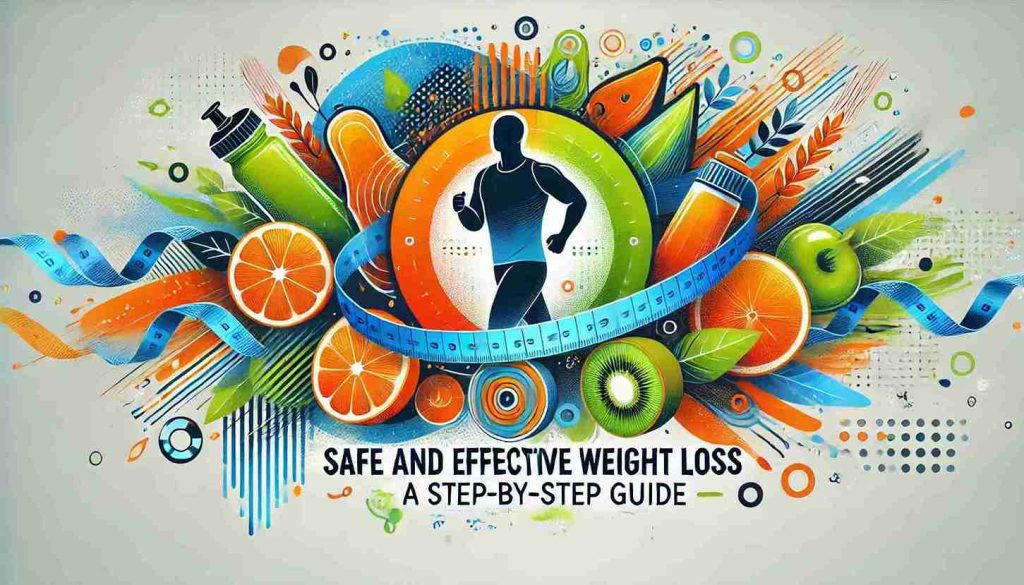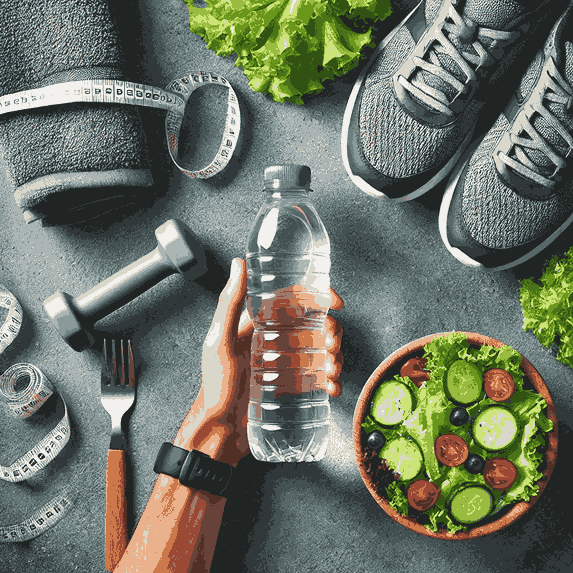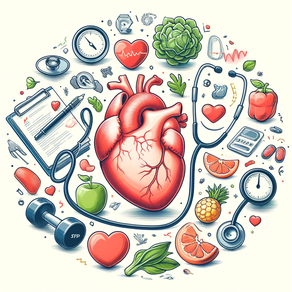
Everyone wants to lose weight quickly, but doing it right is crucial. Safe and effective weight loss is not about extreme dieting or exhausting workouts. It’s about making healthy changes your body can handle and sustain over time. This simple guide will help you understand the best safe, natural, and effective weight loss tips and strategies.
Transitioning to a healthier weight takes patience, strategies, and understanding. This guide will provide easy-to-follow tips on how to lose weight safely, effectively, and sustainably—while feeling your best!
Why Safe Weight Loss Matters

Safe weight loss is essential because it focuses on long-term health rather than short-term results. Losing too much weight too quickly can lead to muscle loss, nutritional deficiencies, and even harm your metabolism. When you focus on safe weight loss, you are taking care of your body by giving it time to adjust to the changes.
Understanding Effective Weight Loss
Effective weight loss doesn’t mean just losing weight fast. Instead, it’s about losing weight in a way that is healthy and keeps the weight off in the long run. Effective weight loss involves a combination of healthy eating, regular physical activity, and lifestyle changes.
Key Components of Effective Weight Loss:
- Balanced diet: A variety of foods from different groups.
- Regular exercise: 30 minutes of moderate activity most days.
- Healthy habits: Developing mindful eating and good sleep patterns.
Healthy Weight Loss vs. Crash Dieting
Crash dieting can be tempting because of the quick results, but it often leads to regaining the weight—and even more! Healthy weight loss, on the other hand, helps you shed pounds slowly and steadily while maintaining your energy levels and overall well-being.

Dangers of Crash Dieting:
- Nutritional imbalances
- Fatigue and low energy
- Increased cravings
- Possible health risks
Benefits of Healthy Weight Loss:
- Better energy levels
- Reduced cravings
- Improved mood
- Sustainable long-term results
Building a Sustainable Weight Loss Plan
When thinking about how to lose weight safely, one of the most important aspects is sustainability. Sustainable weight loss focuses on forming habits you can stick to for life. Whether it’s choosing healthier snacks or adding more movement to your daily routine, sustainability is key.
Tips for Building a Sustainable Plan:
- Set realistic goals: Aim to lose 1-2 pounds a week.
- Create small, achievable habits: Start with something simple like cutting out sugary drinks.
- Focus on long-term health: Remember, weight loss is a marathon, not a sprint.
Natural Weight Loss Strategies
Natural weight loss strategies involve using methods that are in tune with your body. Instead of relying on weight loss pills or fad diets, focus on wholesome, natural foods and practices. Some great strategies include incorporating more fruits, vegetables, lean proteins, and whole grains into your diet, as well as practicing mindful eating.

Real-Life Examples of Safe Weight Loss
Take Sarah, for example. She started by simply walking for 30 minutes a day and swapping out sugary snacks for fruits. Over a year, Sarah lost 20 pounds safely and feels healthier and more energized than ever. Another success story is Mark, who cut out sugary sodas and began cooking at home more often, resulting in gradual and sustainable weight loss.
Top Weight Loss Tips for Lasting Results
Weight loss doesn’t have to be complicated. By following a few simple tips, you can make your journey easier and more effective. Here are some safe and effective weight loss tips that can help you stay on track:
- Eat more protein: Protein keeps you fuller for longer and helps build muscle.
- Stay hydrated: Drink at least 8 glasses of water a day to help your body function properly.
- Move daily: It doesn’t have to be a gym workout—walk, dance, or even play outside.
Exercise for Safe Weight Loss
Exercise plays a critical role in safe weight loss, but it doesn’t mean you have to spend hours in the gym. You can incorporate simple activities like walking, biking, or even dancing to burn calories. The key is finding something you enjoy so that you can stick with it long-term.
Benefits of Exercise for Safe Weight Loss:
- Burns calories
- Boosts metabolism
- Improves mental health
Nutrition: The Heart of Healthy Weight Loss
Nutrition is the foundation of healthy weight loss. You can’t out-exercise a bad diet! By focusing on nutrient-dense foods like vegetables, lean proteins, and whole grains, you’ll feel satisfied while giving your body the fuel it needs to lose weight.
Nutrient-Rich Foods to Include:
- Vegetables: Spinach, kale, and broccoli.
- Fruits: Apples, oranges, and berries.
- Lean proteins: Chicken, fish, and beans.
Mindful Eating and Its Role in Weight Loss
Mindful eating is all about being aware of what and how you eat. Instead of eating in front of the TV, take time to enjoy your meals, chew slowly, and pay attention to hunger cues. Mindful eating helps prevent overeating and encourages healthier choices.

Hydration and Its Impact on Safe Weight Loss
Staying hydrated is one of the simplest yet most effective weight loss strategies. Water helps keep your metabolism working, flushes out toxins, and can even reduce hunger. Aim to drink at least 8 glasses of water a day, or more if you are active.
Tracking Your Progress for Effective Weight Loss
Tracking your progress is an excellent way to stay motivated. Whether you use an app, journal, or just take regular photos, seeing how far you’ve come can boost your confidence and keep you on the right path.
Overcoming Plateaus in Your Weight Loss Journey
Sometimes, even when you’re doing everything right, your weight loss might slow down. This is called a plateau. Plateaus are normal, but the key is to stay consistent and maybe switch up your routine a bit, such as trying new exercises or adjusting your calorie intake.
Common Weight Loss Mistakes to Avoid
While it’s great to have a weight loss plan, certain common mistakes can slow you down. Here are some pitfalls to avoid:
- Skipping meals: This can slow your metabolism and lead to overeating later.
- Relying on diet alone: Exercise is an important part of the process.
- Expecting instant results: Remember that safe weight loss is slow and steady.
Conclusion: A Journey Towards Safe, Healthy Weight Loss
Safe and effective weight loss isn’t about drastic changes or quick fixes. It’s about making smart choices, building healthy habits, and staying consistent. Whether it’s through balanced nutrition, regular exercise, or mindful eating, the key is finding what works for you and sticking with it.
Have any tips or experiences of your own? Leave a comment below, share this with friends, and don’t forget to subscribe for more health tips! – we’d love to hear from you!
Frequently Asked Questions (FAQs)
1. What is the safest way to lose weight?
The safest way to lose weight is to make gradual changes to your diet and lifestyle. Aim to lose 1-2 pounds per week through a combination of healthy eating, regular exercise, and proper hydration. Avoid crash diets and weight loss pills.
2. How long does safe weight loss take?
Safe weight loss takes time and varies depending on your body and habits. Most experts recommend losing 1-2 pounds a week, which means it could take several months or even longer to reach your goal. Remember, it’s about long-term health, not quick fixes.
3. Can I lose weight without exercise?
Yes, you can lose weight without exercise, but it may be slower. Combining a healthy diet with exercise will give you the best results, as it helps burn more calories and builds muscle.
4. What foods should I avoid for effective weight loss?
To achieve effective weight loss, avoid processed foods, sugary drinks, and excessive fast food. Focus on whole foods like vegetables, lean proteins, and whole grains instead.
5. How can I maintain my weight loss?
To maintain weight loss, continue practicing the healthy habits you’ve built, like eating balanced meals, staying active, and getting enough sleep. It’s important to view weight loss as a lifestyle change rather than a temporary fix.



Pingback: Superfoods: What They Are and Why They’re Important
Pingback: How to Maintain a Healthy Diet on a Budget: Top 10 Tips